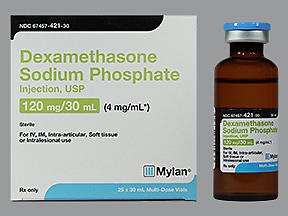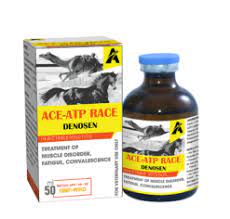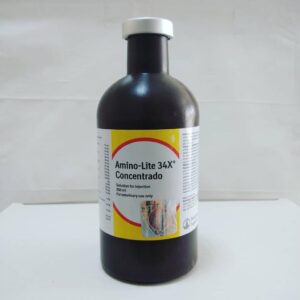Dexamethasone Sodium Phosphate
Human Dosage:
For anti-inflammatory or allergic conditions: Dexamethasone Sodium Phosphate
Typically ranges from 0.5 mg to 24 mg per day, depending on the severity and response.
For cerebral edema:
10 mg IV initially, followed by 4 mg every 6 hours until symptoms improve.
Shock (e.g., septic or anaphylactic shock):
High doses such as 2-6 mg/kg body weight initially, followed by smaller doses.
For severe asthma/COPD exacerbation:
4 mg to 20 mg per day in divided doses.
Eye conditions or inflammation:
Dosage may range from 0.5 mg to 1 mg/day, with lower doses tapered gradually.
Veterinary Dosage:
Dogs and Cats:
For anti-inflammatory purposes, doses range from 0.1 to 0.3 mg/kg body weight, depending on the severity of the inflammation.
Horses:
The dose may range from 2 to 5 mg IV or IM for inflammatory conditions.
Cattle:
5 to 20 mg IM, depending on the condition being treated (e.g., shock or ketosis).
Note: Dosages should always be prescribed by a healthcare or veterinary professional based on specific needs.
Side Effects of Dexamethasone Sodium Phosphate
While effective, dexamethasone sodium phosphate can cause a range of side effects, especially with long-term or high-dose use.
Short-term side effects:
Fluid retention (edema)
Elevated blood sugar (hyperglycemia)
Increased appetite
Mood changes: Anxiety, irritability, or insomnia.
Gastrointestinal upset: Nausea, heartburn, or even peptic ulcers.
Long-term or high-dose side effects:
Osteoporosis: Prolonged use can lead to bone loss and fractures.
Suppression of adrenal glands: Long-term use can suppress the body’s natural cortisol production, leading to adrenal insufficiency.
Cushing’s syndrome: Characterized by weight gain, a round face (moon face), and high blood pressure.
Muscle weakness and atrophy.
Increased risk of infections: Due to immunosuppressive effects.
Delayed wound healing: Reduced ability of tissues to heal.
Hypertension: Steroids can increase blood pressure.
Gastrointestinal ulcers: Steroids can increase the risk of developing ulcers and gastrointestinal bleeding.
Veterinary-specific side effects:
Increased thirst and urination (polydipsia and polyuria) in dogs and cats.
Laminitis in horses: A potentially serious condition affecting the hooves.
Weight gain and muscle atrophy.
Immune suppression, making animals more susceptible to infections.
Increased appetite in dogs, leading to overeating.
Precautions and Contraindications:
Infections: Dexamethasone sodium phosphate should be avoided in patients with untreated systemic infections unless they are being treated with appropriate antimicrobial therapy.
Diabetes: Caution in patients with diabetes due to its ability to raise blood sugar levels.
Liver disease: May need dosage adjustments due to altered metabolism.
Pregnancy and breastfeeding: Dexamethasone crosses the placenta and can affect fetal development, so it should be used cautiously in pregnant women or animals.
Use in animals: Overuse in animals, especially in horses, can cause conditions like laminitis, so it should be used judiciously.
Drug Interactions:
Nonsteroidal anti-inflammatory drugs (NSAIDs): Concurrent use increases the risk of gastrointestinal ulcers.
Diuretics: May increase potassium loss, leading to hypokalemia.
Insulin and oral diabetes medications: Dexamethasone can increase blood sugar, necessitating dosage adjustments.
Antibiotics: Some antibiotics may have their effectiveness altered when used with corticosteroids.
Storage and Handling:
Storage: Dexamethasone sodium phosphate injections should be stored at room temperature (15°C to 25°C or 59°F to 77°F), protected from light, and not allowed to freeze.
Conclusion:
Dexamethasone sodium phosphate is a powerful and fast-acting corticosteroid used for a variety of inflammatory and immune-mediated conditions in both humans and animals. It is effective for managing conditions like allergic reactions, autoimmune disorders, brain swelling, and respiratory inflammation.
However, it must be used carefully due to the potential for significant side effects, especially with long-term or high-dose use. Always consult a medical or veterinary professional for proper dosing and to avoid complications.
Dexamethasone Sodium Phosphate is the water-soluble, injectable form of the corticosteroid dexamethasone, used to treat a variety of conditions that involve inflammation, immune responses, and hormonal imbalances. It is frequently used in both human and veterinary medicine for its potent anti-inflammatory and immunosuppressive properties.
What is Dexamethasone Sodium Phosphate?
Active Ingredient: Dexamethasone sodium phosphate is a synthetic glucocorticoid, similar to cortisol, a hormone naturally produced by the adrenal glands. It is designed to provide rapid relief from inflammatory and autoimmune conditions.
Solubility: The phosphate form makes it highly water-soluble, allowing for rapid absorption when injected.
Mechanism of Action: It works by reducing inflammation through the suppression of the immune response, inhibiting the release of inflammatory mediators like prostaglandins and leukotrienes.
Uses of Dexamethasone Sodium Phosphate
Dexamethasone sodium phosphate is used to manage a wide range of medical and veterinary conditions, including:
Human Medicine:
Severe allergic reactions (anaphylaxis): Used to control severe allergic responses by reducing swelling and immune activity.
Asthma and chronic obstructive pulmonary disease (COPD): Reduces airway inflammation and improves breathing.
Cerebral edema: Reduces swelling in the brain caused by trauma, stroke, or tumors.
Autoimmune diseases: Treats conditions like lupus, rheumatoid arthritis, and multiple sclerosis by suppressing the overactive immune system.
Shock (septic shock or anaphylactic shock): Used as part of emergency treatment to stabilize patients.
Cancer: Helps manage the side effects of cancer treatments, reduces brain swelling in patients with brain tumors, and acts as an anti-nausea agent in chemotherapy.
Eye conditions: Used in eye surgeries or inflammatory eye diseases like uveitis to reduce swelling and prevent damage.
Skin conditions: Treats severe dermatological conditions like eczema, psoriasis, and allergic skin reactions.
Veterinary Medicine:
Anti-inflammatory use: Treats conditions such as arthritis, tendinitis, and dermatitis in horses, dogs, and cats.
Respiratory conditions: Helps animals with chronic respiratory diseases like asthma in cats or inflammatory airway disease in horses.
Shock or trauma: Administered to stabilize animals in cases of shock or severe trauma.
Allergic reactions: Used for acute allergic responses to insect bites, food allergies, or other triggers.
Immunosuppressive therapy: Helps manage autoimmune diseases in animals like immune-mediated hemolytic anemia (IMHA).
Forms and Routes of Administration:
Dexamethasone sodium phosphate is typically administered through injection. It is available in various strengths, including:
1 mg/mL, 4 mg/mL, and 10 mg/mL solutions for intravenous (IV), intramuscular (IM), or subcutaneous (SC) injections.
Intravenous (IV): Provides the fastest action, especially in emergencies such as anaphylaxis or shock.
Intramuscular (IM): Slower absorption than IV but provides a prolonged effect.
Subcutaneous (SC): Can be used for slower absorption over time, though less common.
Dosage of Dexamethasone Sodium Phosphate
The dosage depends on the condition being treated, the severity of the symptoms, and the patient’s size and medical history. Here are general guidelines:




Reviews
There are no reviews yet.